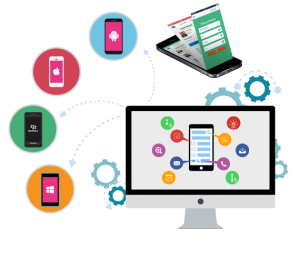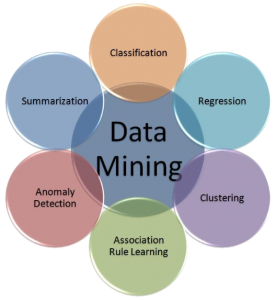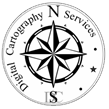Information Technology
It is a system designed to capture, store, manipulate, analyze, manage, and present spatial or geographic data. These applications are tools that allow users to create interactive queries (user-created searches), analyze spatial information, edit data in maps, and present the results of all these operations . It sometimes refers to geographic information science , the science underlying geographic concepts, applications, and systems .
Our Application Development portfolio can be broadly classified into work been done for three main platforms; web, mobile and cloud. By aligning business processes, professionals and technology in a symbiotic relationship, we can offer a bespoke methodology to suit your working environment and financial framework. The benefit of partnering with us will  ensure that your industry specific process is effectively entwined with decision support, seamless functioning of all processes is imperative for the growth of a company.
ensure that your industry specific process is effectively entwined with decision support, seamless functioning of all processes is imperative for the growth of a company.
There are three types of Application Development .
They are :-
Web Applications are Client/Server application programs specifically developed to run on thin-client web browser with client rendering languages such as HTML, JavaScript and CSS. Server side of the web application is developed on a powerful application development Framework such as .NET/Java with high performance Relational Database Management Engine. Web Applications have ubiquitous advantages of Central Application Server/Database Management and Cross Platform Management in a heterogeneous environment.
The Service Profile Includes
- Customised Web Application Development
- Web GIS based Application Development
Platform :-
- Asp .Net (C#, VB)
- Java
- ArcGIS
- Java script
- jQuery
- CGI/Perl
- Python
- Ruby on Rail
- Silverlight
- SQL Server
- Oracle
Advantages
- Universal thin-client application
- Centrally managed Database repository/ Application for easier maintenance/ concurrency accessibility
- Platform independent
- High-Availability
Mobile Application :-
Mobile applications are developed for low-powered handheld devices such as PDA/EDA and Mobile phones. The applications can be downloaded from the mobile software distribution platform or delivered as mobile web application to provide an application-like user experience in mobile web browser.
The service profile includes:
- Customized mobile application development for Windows/Android/Apple device
- Mobile based Map Service Applications using ArcGIS/Google API
- Messaging Service based Mobile Applications
Platform
- .NET Compact Framework (C#, VB.NET)
- Windows Mobile/ Phone Application Development Framework
- Android (Java, C, C++)
- iOS SDK (xCode, Object C)
- Python (Eclipse)
Advantages
- Remote Application accessibility through hand-held mobile devices
- Remote data assimilation and information dissemination
- Mobile GIS applications to assist in navigation/ground- truthing/field data collection
Cloud Application
Cloud Computing is a model for enabling convenient, on- demand network access to a shared pool of configurable computing resources such as Communication networks, Data storage, Application/Database Servers, Applications and Services. The Cloud based Application can be rapidly provisioned and released with minimal management effort and service provider interaction. Deployment of cloud solution results in reduced administrative effort, scalable computing infrastructure environment, load sharing in world- wide distributed environment, collaborative access across company boundaries, contract flexibility and high reliability/availability and elasticity.
The Service Profile Includes
1. Cloud based modular GIS Applications in SaaS mode
2. Customized GIS application development/ deployment in cloud environment
Platform :
- Microsoft Silverlight
- Microsoft Windows Azure
- Microsoft SQL Azure
- ArcGIS online
Advantages :
- Low CTC & high ROI through provision of Infrastructure as Service (IaaS) and Software as Service (SaaS)
- Zero maintenance cost
- High Availability
- Scalable Application/ Infrastructure Services
Focusing on the information requirement, the data mining and business analytics involves the development and the implementation of the heuristic data algorithms for high-volume data management and information extraction mining-out the hidden patterns, identification of unknown co-relations and tasks specific information which can be utilised to augment the business intelligence. The resulting business intelligence can be utilized for the business development and achieving competitive advantage over the business rivals resulting in the growth and profitability.
Our development centre has a specialised Data Mining and Data Analytics facility with a well-organised team of experienced database experts with expertise in managing high-volume data and data marts and business analytics which is supported by the experienced project and task managers.
DCS’s data mining methodology assists companies to function efficeiently by providing the data managers with the right information to take business decisions through processing of huge log of transaction data as data from auxiliary sources such as web server logs, internet click-stream data and social media activity reports which are usually left untapped by the conventional business intelligence software.
Computational social science refers to the academic sub- disciplines concerned with computational approaches to the social sciences. This means that computers are used to model, simulate, and analyze social phenomena. Fields include computational economics, computational sociology, cliodynamics, culturomics, and the automated analysis of contents, in social and traditional media. It focuses on investigating social and behavioral relationships and interactions through social simulation, modeling, network analysis, and media analysis.
Computational social science revolutionizes both fundamental legs of the scientific method: empirical research, especially through big data, by analyzing the digital footprint left behind through social online activities; and scientific theory, especially through computer simulation model building through social simulation. It is a multi-disciplinary and integrated approach to social survey focusing on information processing by means of advanced information technology. The computational tasks include the analysis of social networks, social geographic systems, social media content and traditional media content.
